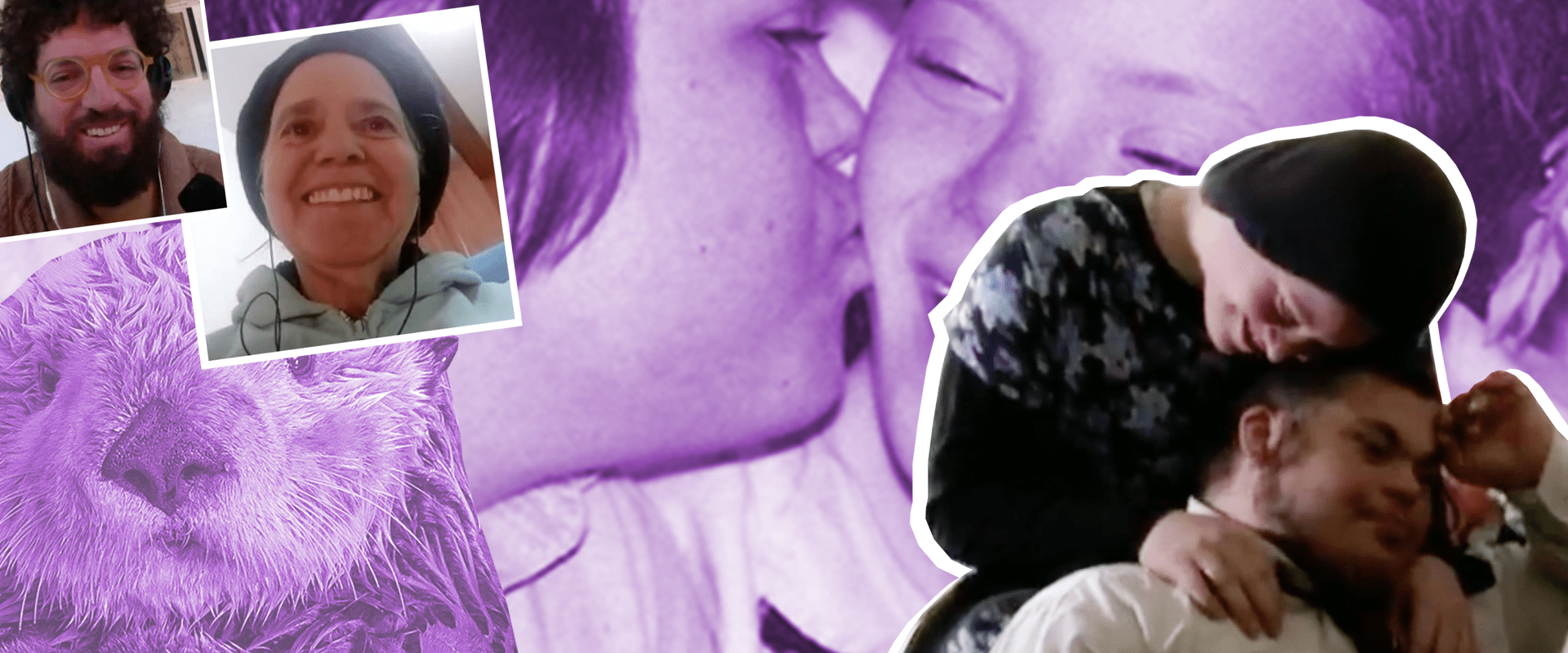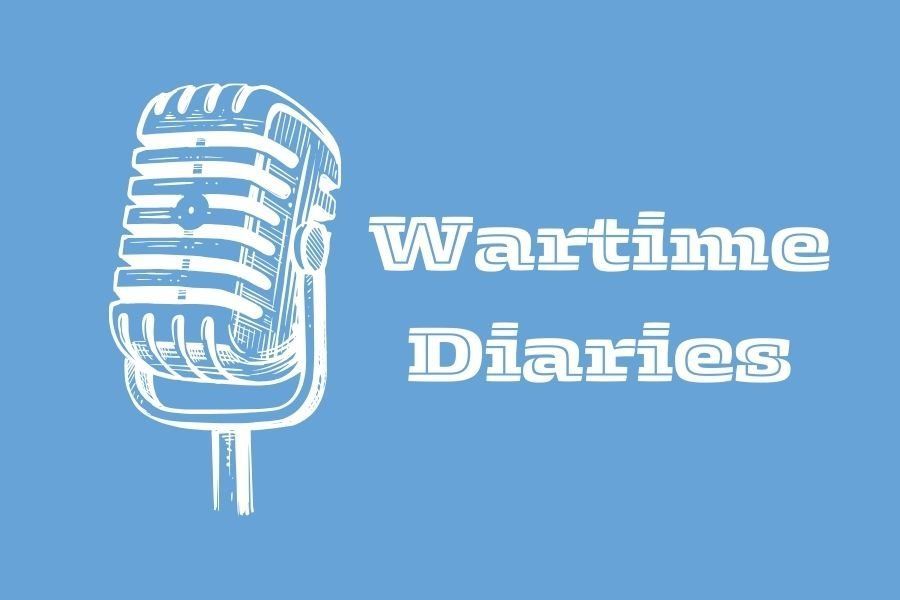
On March 22, 2020, as we were all just starting to fathom the new reality we were about to enter, hundreds of Israel Story fans went online to hear an update from an ultra-Orthodox woman from Tzfat. Six years ago, Chaya Ben Baruch’s inspiring story brought listeners around the world to tears. It was the story of a trailblazer who wouldn’t let life, and the many obstacles it presented her, dictate reality.
Love Syndrome, Revisited
Chaya grew up as Enid, in a “Conservadox” Jewish family in Far Rockaway, N.Y. Like many women of her generation and from her background, Chaya’s life seemed to be preordained – she’d go to school, marry a nice Jewish boy, raise a family, and be active in the community. But Enid had different plans: midway through college, she left that structured world behind and ventured off to far-away Fairbanks, Alaska, to study the mothering patterns of sea otters.
A decade, three children, and one failed marriage later, Enid met Stan – a tall, Catholic salmon fisherman from the Gold Stream Valley. Together they had three more kids, the last of whom – Angkor – was born with Down Syndrome. While many parents – especially at the time – might have viewed this as a devastating misfortune, Enid and Stan saw it as an opportunity. They were determined to find Angkor a partner; a soulmate. That wish of theirs kicked off an incredible journey that led the family from Alaska to Tzfat, in the north of Israel, and – on the way – precipitated a return to Judaism. Mishy Harman brings us a tale that unfolds in courtrooms, hospitals, Ultra-Orthodox yeshivas, immigration centers and wedding halls.
In today’s episode we hear the original story that aired in 2014, followed by a short update from Chaya. Did her Angkor ever find his soulmate? What happened to the young couple? And what is it like to parent special needs children who leave the nest? All this and more in an edited conversation between Chaya and Mishy at the end of the episode.
Mishy Harman: OK, so hopefully this is working. Hi Chaya!
Chaya Ben Baruch: Hi Mishy. How are you?
Mishy Harman: Good. It’s been a long time. How are you doing?
Chaya Ben Baruch: We’re doing great. We really are. With everything that’s happened, we’re doing great.
Mishy Harman: Are you in quarantine?
Chaya Ben Baruch: No, we’re not in quarantine. But everybody in Tzfat has pretty much been asked to be in their homes. Being home with their families with this virus floating around, makes you realize what’s really, really important. Holding Ori, snuggling with Ori, is much more important to me than a lot of other things. And when I get really, really stressed I get on Netflix and I watch Korean soap operas because they’re cute.
Mishy Harman: [Laughs] So Chaya, I’ll ask you a few questions and then we’ll open it up to our listeners. So, just to recap for everyone – your amazing story was one of the very first stories that we did. It was our second episode. And the story ended with your biological son Avichai and your adopted daughter Kirin, determined to get married…
Chaya Ben Baruch: And they’re almost married for eight years.
Mishy Harman: Right. So I think the first question that’s on everyone’s mind is how are they doing?
Chaya Ben Baruch: So, for two years, they lived in an apartment below us. And then they moved to Rechasim, which is a city about an hour and fifteen minutes away from us. Avichai and Kirin live in their own apartment by themselves. If I could look back like seven years ago as to where they were then and where they are now – it’s incredible. I mean, if somebody would have said to me twenty-eight years ago, your kid with Down Syndrome is going to survive open heart surgery, he’s going to get married, he’s going to work and he’s going to live in a house an hour and a half away from you. That wasn’t written in any single book that I knew of at the time.
Mishy Harman: Chaya, a question from our managing producer Zev in Jerusalem- what was it like to have the couple move to a community an hour away?
Chaya Ben Baruch: It was a big gulp. It was a really, really good thing. It was a really, really hard thing. I’m glad that Avichai and Kirin come home and I see them and I visit them. It’s hard when your kids grow up. And you know, I think for, for parents who have special needs kids who have done a lot for their kids, you just have to realize that sometimes that push helped them become more independent. They have improved so much because we pushed them out of the nest a little bit. And they really, really are thriving very very well. I think supporting a family with special needs is kind of like building a… you know the game Jenga, where you have a tower and you build it? So you build up all the support system. And then little by little, you take them out as they show you that they don’t need them. So for instance, Avichai and Kirin have come back on public transportation back and forth from their house to our house.
Mishy Harman: Does Avichai still call you his “mother-in-law”?
Chaya Ben Baruch: Yes, yes. He was supposed to stop drinking cola. And I told him “you’ve got to stop drinking cola because it’s not healthy.” And he said, “I don’t have to listen to you, mom.” I said, “Avicahi I’m your mother.” He said, “no, I don’t have to listen to you. You’re not my mother.” I said, “Avichai, I gave birth to you” and he said, “Mom, you’re just my ‘shviger,’” which in Yiddish is your mother-in-law. But thank G-d he stopped drinking cola and Kirin asked him to, and and he’s pretty good about it. And now when he go visits people, they know not to give him cola. They give him other stuff, but they don’t give him cola [Mishy laughs].
Mishy Harman: Um, how is Shalhevet doing? Does she have any connection with her birth mother?
Chaya Ben Baruch: Shalhevet has no connection with her birth mother or her biological siblings. She has two siblings that – to my knowledge – don’t know that she exists. When someone asked Shalhevet, “so do you want to get married just like your sister?” (because Shalhevet and Kirin have a great relationship). She said, “Lior Levy,” which means she wants to marry Lior Levy who’s a young man with Down Syndrome. And she gets to see Lior every day at work. And then when they come home, they get together and umm… We’re working on them hopefully getting married. I think it’s taking us longer period of time just because his mother wasn’t quite sure that he wanted Shalhevet plus wanted the wedding. She was afraid that he just wanted the wedding kind of a thing. But um [Mishy laughs] he actually on his own initiative bought her a bracelet. And this past summer I took her out. I was chaperoning them both to go to… on a date to a pizza place. He told his mother to stay home because he knows that his mother is like, much more wary about them getting married. I think that, given the right support, I think they’d do just fine. They’re really really are cute together.
Mishy Harman: Chaya, so a question from a dear, dear friend who is like family to me, Jeanette Kuvin Oren. She asks, “do you think the stigma of having a Down Syndrome child in the observant community is lessening? Are they more inclined to keep and love their children now?”
Chaya Ben Baruch: So yes, it is lessening. It still exists. There’s still families that are giving up their babies, for whatever reason, and they’re not just the Ultra-Orthodox. Two years ago we had a baby come to us around Pesach time. Her biological parents just didn’t feel that they could take care of her. She came to us. We took care of her for a month and then the Welfare Department said, ‘this child is going to be adopted.’ And in Israel, there can’t be more than forty-three years between the mother and the baby and I was way over forty-three years difference between the baby. It was heartbreaking for us but for a month, this baby was totally loved. Avichai thought, ‘oh, mom went to the hospital and got me a baby.’ And [laughs] and she actually kind of looked like Avichai. But she was incredible. She is incredible. But we took her initially thinking maybe it would give the parents a chance to kind of calm down and see if they could actually rethink this. And in the end, she went to another family, where the mother has a brother with Down Syndrome. I send presents and they send me pictures and updates. So I know that she’s in a wonderful family and she’s doing really really well. And she’s very high functioning.
Mishy Harman: Okay, so Chaya, we have a question from Skyler from Tel Aviv – what was the audience response to the story like? Were you surprised by any of it and how did it feel from a personal perspective to hear your story in this format?
Chaya Ben Baruch: I loved hearing my story because I love, I like really listening to people’s stories on, on Israel Story. I love listening to Israel Story.
Mishy Harman: Oh, yoffi.
Chaya Ben Baruch: I think my, my prayer has always been that my story will make people look at individuals with special needs differently. For instance, right now, there are countries that are boasting by 2020, there will be no more Down Syndrome individuals born in their country because the country itself is encouraging people to take a blood test that can determine whether or not you’re carrying a child with Down Syndrome or some other genetic abnormality. And the countries are paying for abortions, like Iceland. And there’s quite a few countries that are actually that’s their policy right now.
Mishy Harman: Emm hmm.
Chaya Ben Baruch: I think people need to have choices. And I think they need to know that it’s, it’s not, you know, ‘oh, no, I’m gonna have to take care of this child for the rest of my life kind of thing.’ I look at my, my daughters especially and I think what’s so bad about them that their mothers had to give them up for whatever reason? Because I really had just gotten so much out of being with them. So basically, I… I tell my story because people have asked me to tell my story because they have children with Down Syndrome, and they want the world to accept their children.
Mishy Harman: So Chaya, I think we’re gonna wrap up but I just wanted to say that there were many, many questions that sort of reflect my own feeling and, has been my feeling since the first day I ever met you – when I sort of sheepishly walked into your apartment and didn’t know whether we would shake hands or not, and by the end of our first meeting you you, you asked whether it would be okay if we hugged.
Chaya Ben Baruch: Right.
Mishy Harman: And uh…
Chaya Ben Baruch: Of course today we couldn’t do that.
Mishy Harman: Right, right. Today, today, we would have to maintain some physical distancing guidelines, but basically, Chaya, I think a lot of people are expressing how inspired they are by your resolve and your determination and your energy and goodness and kind heart. So thank you all so, so much and mainly, mainly thank you Chaya. And I miss you and love you and hope to see you soon.
Chaya Ben Baruch: I love you too. Bye.
Mishy Harman: Bye.
Credits
The original episode was scored by Pejk Malinovski with music composed and performed by Rob Burger. Julie Subrin, Yoshi Fields, and Zev Levi edited the episode, which was mixed by Sela Waisblum. Additional music by Broke for Free. The end song, “Nekuda Tova” (“Good Point”) is by Shuli Rand, and features vocals by Ehud Banai.
Thanks to Kitra Cahana, Jodi and Gary Rudoren, Rina Castelnuovo, Me’ira Weiss, Norman Gililand, Basya Shechter, Avi Heller, Charles Monroe-Kane, Caryl Owen and all the team at Wisconsin Public Radio’s To The Best of Our Knowledge.
Sponsors

Project Kesher is a non-profit organization that empowers and invests in women. They develop Jewish women leaders – and interfaith coalitions – in Belarus, Russia, Ukraine and Israel, deliver Torahs to women who’ve never held one before, broadcast women’s health information on Ukrainian Public Radio, and help Russian-speaking immigrants to Israel advocate for equal rights.

 Wartime Diaries
Wartime Diaries

